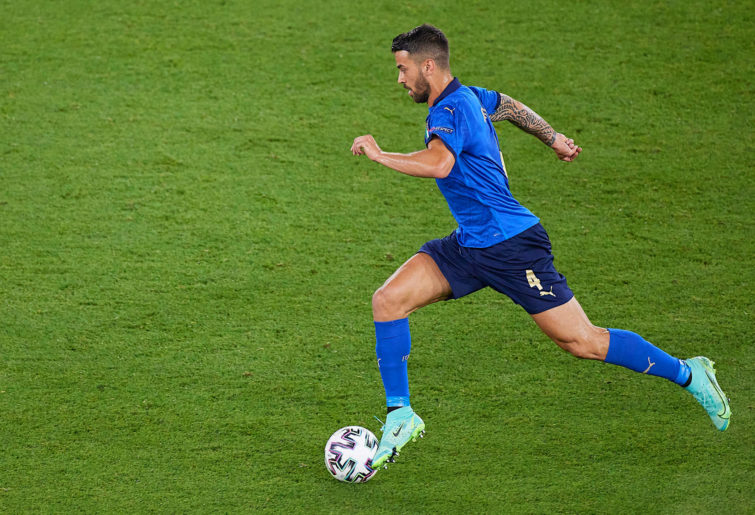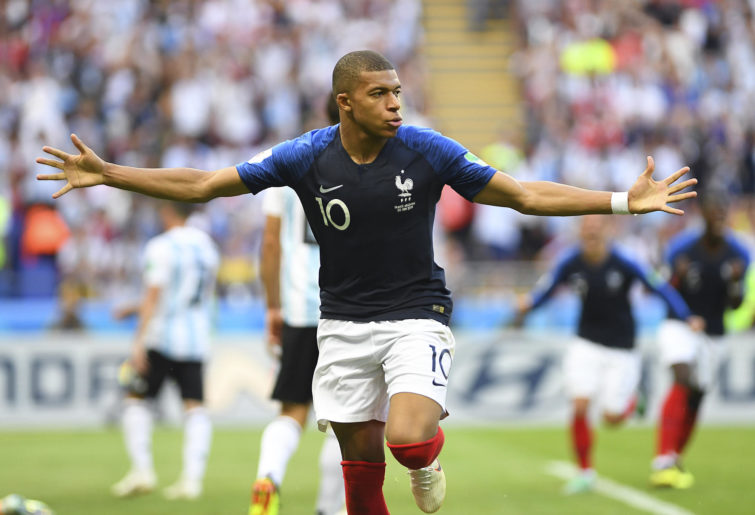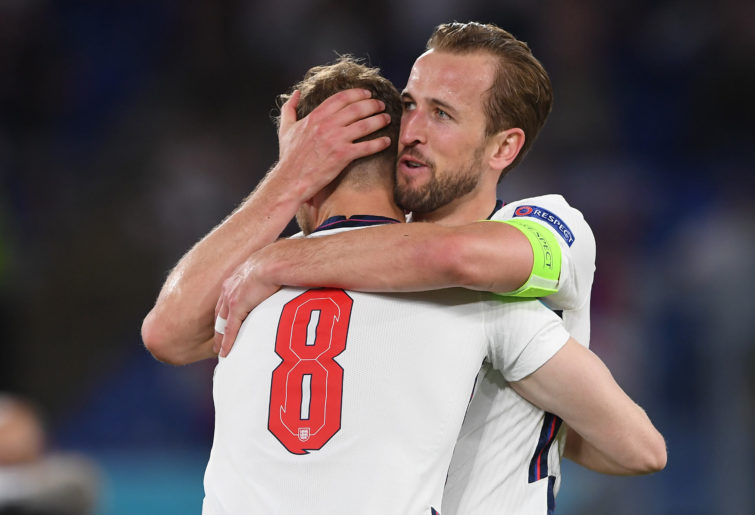In the intervening years through 2020 and 2021, the world turned topsy-turvy dealing with both the Covid-19 pandemic, and the social and logistical ramifications of it.
The scheduled UEFA Euro 2020 football tournament, along with several other sporting events like the Tokyo Olympics, were postponed, ultimately to be scheduled a year later in June 2021 while the pandemic was still raging on.
The unscheduled three-month break in world football in 2020 was a catalyst for bringing to an end both the individualistic dominance of Lionel Messi and Cristiano Ronaldo, and more interestingly there was a more epochal, generational shift away from the old money clubs like Real Madrid, Juventus and most strikingly Barcelona.
The lack of spectators at home matches in 2020 and therefore of ground receipts – along with other mismanagement – meant that they all found their funds run low compared to the new wave of superclubs as Manchester City, Paris-Saint Germain, Chelsea and still Bayern Munich, financially backed respectively by the nation-states of the UAE, Qatar, a Russian Oil oligarch, and to some extent Qatar again.
These four clubs reached the first two Champions League finals of the new decade of the 2020s, the decade already shaded by the pandemic and change.
Beyond money, football was now in thrall to method.
The greatest coaches of the 2010s, Jurgen Klopp, Pep Guardiola and potentially new boy Thomas Tuchel, all honed in Germany to an extent, had instilled full-team attacking strategies into their teams that involved coordinated runs and pressing; precise, pre-planned collective movement and positioning of both ball and players; and most crucially to Messi and Ronaldo, no passenger forwards.
Total football had finally won after 40 years, as defensive dinosaurs like Jose Mourinho and off-the-cuff laissez-fairers like the Spanish clubs were left behind.
All three of these coaches had eventually followed the money and ended up in England, under whose tutelage Liverpool, Manchester City and Chelsea all reached the Champions League final in this timeframe.
The postponed 2021 European Championship, held in eleven different countries, turned out to be a type of oasis from all this. Not a break from the pandemic itself – crowds were deliberately kept low in all but the most contrarian countries like Hungary, and it was later revealed that the final in London had been a superspreader event for the virus.
Nor in the end was it even the neutrally European event the organisers had planned, with the event turning into a de facto home tournament for England, who played all but one game at home including the semi-final and ill-fated final.
But Euro 2021 was something of a break from tales of sportswashing, money, superstar accumulation and individual hero-worship.
The winning team, Italy, barely had an internationally recognised player in their entire side, and no individual Italian scored more than two goals.
The fact Italy won this tournament was a glorious rebound for them after a post-2006 World Cup sequence that read: group stage elimination, group stage elimination, did not quality, did not qualify.

Leonardo Spinazzola of Italy runs with the ball. (Photo by Emmanuele Ciancaglini/Quality Sport Images/Getty Images)
Life or death
Already on only the second day of Euro 2021, an agenda was set for what this tournament would ultimately be remembered for.
In a home match in Copenhagen, Danish lynchpin Christian Eriksen controlled a throw-in 30 minutes into their match against Finland, and fell to the ground from heart failure.
Quick thinking among teammates and doctors saved his life, while his stricken Danish teammates formed a ring around the doctors to shield Eriksen’s body from view as Denmark’s captain Simon Kjaer comforted Eriksen’s life partner.
The happening rocked the entire nation of Denmark and the news that a player had technically died on-field travelled worldwide, transcending mere football fans.
A listless Denmark, heartlessly ordered to finish the match hours later on the same day, lost 1-0 to the Finnish debutants, then an understandably much-improved performance nonetheless lost 2-1 to the skilled Belgium.
Their tournament looked over with an understanding that some things were more important – but a galvanised Denmark then swept three consecutive wins to become the feel-good story of the Euros and they barely missed a place in the final itself.
Denmark featured young discoveries Joakim Maehle on the wing and forwards Kasper Dolberg and Mikkel Damsgaard, who shocked Wembley by scoring the only direct free kick of the entire tournament in the semi-final.
Denmark were only undone by their lack of fitness against England in the tournament’s penultimate match.
Mourez la France!
Group F featured the three champions from the three previous major tournaments, France, Germany and Portugal, for what was a captivating group of death.
It culminated in a final day of 2-2 draws where all four final group positions were up for grabs and were altered with each goal scored.
But each of these three supposedly major teams only won one match for the tournament, and all three were booted at the first knockout match for various reasons: Portugal because they were always less than the sum of their parts; Germany because they no longer had the parts, the glory years being at least four years in the past; and France because…?
World Cup winning coach Didier Deschamps set the cat among the pigeons a month from the tournament by unexpectedly recalling banished forward Karim Benzema to the French team, who with Kylian Mbappe and Antoine Griezmann would at the last minute attempt to form a dream team trio of epic proportions.
The raw talent of France’s World Cup-winning squad was seemingly double that of any other nation at Euro 2021.
As in 2018, France were frustratingly consistently inconsistent in winning their group, but conceded five goals in their last two matches and were dumped from Euro 2021 by Switzerland in an absolutely staggering way in one of the greatest Euro matches in history.
A Swiss penalty promised a 2-0 lead on the sluggish France in the 55th minute.
This finally woke France up in the tournament, enough not only for Lloris to save the penalty, but for Benzema to score twice and immediately give France a 2-1 lead within minutes.
Pogba’s long-range strike, almost a screenshot of how easy it can be for top teams to coast by on their skills, put France 3-1 up and inspired them to put the cue in the rack with fifteen minutes left.
They exasperatingly conceded two equalising goals in the final ten minutes, the last an epic steal in midfield, vertical pass, dribble and arrowed shot into the bottom corner by the Swiss Gavranovic in injury time.
Both teams took their penalties like champions until the golden boy Kylian Mbappe took penalty number ten, score or bust. He had not scored a goal in the tournament and gossip concerning classic French squad disharmony had centred on him through the tournament.
Homer himself could not have designed the saga of hubris more poetically as Mbappe’s saved penalty eliminated France from the tournament. Only one teammate commiserated with Mbappe as he walked away. It was seemingly back to the drawing board for the heir apparent world number one player.

(Photo by Michael Regan – FIFA/FIFA via Getty Images)
We’re back!
After traumatically missing qualification for World Cup 2018, the world purred at the sight of Italy’s return.
In Rome they compiled a 7-0 group stage goal differential, featuring the fizzing ball movement and coherent pressing of a club side. Italy were starless, a team who let the ball do the talking and who shared goals evenly among each other.
Perhaps the 2-1 dismantling of the starry but aged Belgium in the quarter-final revealed Italy in all its glory, until buzzy left-back Leonardo Spinazzola went down injured, which changed Italy’s characteristics.
Young forward Federico Chiesa was inserted into the team halfway through the tournament when their other forwards were revealed as not up to speed, scoring crucial and beautiful openers in tight, fraught knockout matches against Austria and Spain.
Spain had been shockingly inconsistent throughout Euro 2021, compiling goal tallies of 0, 1, 5, 5 and 1 (own goal), but raised their game beautifully for their Italian semi-final. Italy expertly applied the press on Spain – but Spain even more expertly were skilled enough to pass their way through it.
Their figurehead was 18 year-old central midfielder Pedri, who had a 100% pass efficiency until the middle of extra time, when he sprayed a single pass.
Meanwhile blond wide forward Dani Olmo was everywhere, and if the other wide forward Mikel Oyarzabal hadn’t played such a shocker Spain would almost certainly have won.
But football being football, they were left to play catch-up after Chiesa’s brilliant curling goal. Spain equalised equally brilliantly with Alvaro Morata’s simple one-two with Olmo and finish.
Morata was Spain’s enigmatic punching-bag of a forward, who scored crucial goals while missing others, and of course was the man who missed Spain’s last losing penalty.
1966 and 2021
I should probably have given the tournament’s final word to Italy who did after all, win the thing. But Italy’s tournament slowed down as it approached the end, while England’s seemed to be a boulder rolling downhill, providing perhaps the more compelling narrative.
There were doubts about whether England were actually any good or not, in much the same way as France’s play in 2018 always left something to be desired despite the victories.
England had had an impressive but functional tournament in 2018, reaching the World Cup semi-final for the first time in a generation and only the third time ever.
For such a stacked team, England’s attacking was clunky and their goals usually ad-libbed by Raheem Sterling and sometimes Harry Kane.
But the defensive structure was sound, goalkeeper Jordan Pickford and defender Harry Maguire like in 2018 were again raising their game on the international scene, and maligned left-back Luke Shaw was having an absolutely stellar tournament.
The sense that this England team was changing the past was confirmed in their generational second round match against Germany at Wembley, a mirror revenge of England’s losing semi-final to Germany at Wembley in 1996.
Shaw was part of setting up both late goals in England’s 2-0 win, their first against Germany at a major tournament since the 1966 World Cup final, again at Wembley.
A tense, fortuitous 2-1 semi-final Wembley win against Denmark set up the day of days: the Wembley final against Italy.
It could not have started better: 2018 figurehead Kieran Trippier’s cross to the far post was brilliantly volleyed home by Shaw after only 120 seconds. England 1-0 in a major championship final, at home.

(Photo by Chris Ricco – UEFA/UEFA via Getty Images)
And then it all fell apart, and the sense of England’s historic night went down the drain. It was revealed afterward that the area around the stadium that day had been a dreadful, post-apocalyptic scene of drug use, violence, drunkenness and gate-crashing the stadium.
Meanwhile within it England’s 2018 World Cup semi-final against Croatia was happening all over again, both of which they slowly but comprehensively lost control after taking the lead within minutes of the start.
England did not approach their own attacking goal at any stage after Shaw’s goal. The whole match was a defensive rearguard against Italian passing. But their defensive structure conceded only one scrambled goal from Italy after 67 minutes.
Though the vibe was now against England, even then all was not lost. England had won two penalty shootouts in a row in 2018-19, reversing their history. Italy, in their second consecutive penalty shootout, missed two, inviting England to win with a bit of nerve.
But England were bizarre in how comprehensively they ballsed up the penalty shootout, sending on two young players cold in the 119th minute who both missed and, after Pickford had brilliantly saved Jorginho’s potential tournament-winning kick for Italy, gave kick number five to a complete novice, 19 year-old Bukayo Saka.
His unimaginative kick was straightforwardly saved by Gianluigi Donnarumma, giving Italy the title and who, in the absence of any true standouts was immediately named player of the tournament for his three saves in Italy’s two penalty shootouts.
Italy’s win had precisely mirrored their 2006 World Cup win over France: a goal conceded within seconds of the kickoff, a tying goal from an antihero centre back (Leonardo Bonucci), and a win on penalties.
The final had provided no real YouTube highlights besides Shaw’s goal, but had been a tense night out to be remembered by two nations forever.
The world enthusiastically congratulated Italy for scoring 13 stellar goals and finding a new way to exist as an Italian national football team.
They were a fine side, but their lack of pure goalscorer, a national characteristic, almost cost the Euro 2021 final and would unbelievably lead to Italy’s second consecutive World Cup non-qualification only nine months later, an epically scripted 92nd-minute concession at home to North Macedonia, virtually their first shot of the match after 32 fruitless Italian ones. Italy’s record of did not qualify, European Champions, did not qualify was a parody of the feast-or-famine life of their football.
But for now, we could bask in the passing and pressing prowess of a team greater than the sum of its parts.































































































